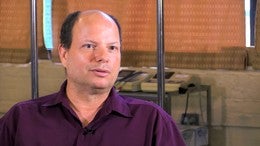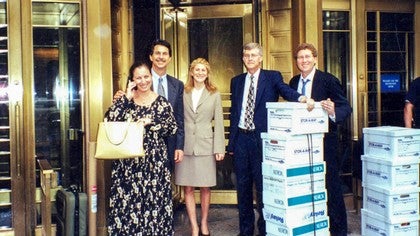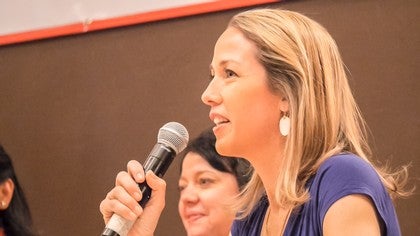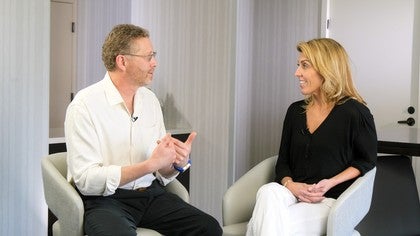Description
About This Video
Transcript
Read Full Transcript
Chapter 1
Making My First Reformer
Hi everyone. It's Christy Cooper. Here I am in Sacramento at balanced body with founder and CEO, an all around. Good Guy, Ken Endelman, welcome and thank you so much for letting me ask you all sorts of questions today. Thanks, Christie. If my facts are correct, I believe that you made your first reformer in 1976 which puts it as almost 40 years of making Pele's equipment. And to some people watching, they may not even realize the [inaudible] has been around that long. So that's just to give you an idea of how much we can learn from this man. First of all, thank you and thanks for letting me be in your huge space.
It had air conditioning and had clean air. And it was on the street and there was parking and stuff. And then on the other hand, we needed a place where we could actually make some of this, these water boots we were selling. So we had a little space at 10 by 20 spot, which is half the size of a garage in a public storage place in Chatsworth. And so that's, that was the first place where I named my first bee farmer. Was that, that was, that was, yeah, that was lik, so the name of the company that water bistro was liquid sleep interiors. LSI.
Yes. And because it was LSI, we got this cease and desist letter from their Sigler corporation that we were infringing on their trademark. But we just agreed we didn't find that one at all because there was nothing new in there.
And I went towards the manufacturing end and then my partner stayed with the store and the store actually stayed in business for another five or six years after that. What about what age were you then? Was 25 25 25 I just, so when I was at liquid sleep, I started that business as a junior and then it got so busy, I actually had to take a year off. And then I went back in my second year at liquid sleep and finished up my senior year. And then I graduated. Yeah, it was busy those days. So one day this lady came in and she wanted me to make a, uh, and we actually had already made a table for, uh, a cool Parsons table and, and she'd come back after that and she wanted us to make a [inaudible] table and she just called it an apparatus and then she told me about it and stuff. And I'm Kinda listening cause you know, I wanna work, I wanna make stuff.
That's what I did. But you know, I kinda thought about this and I thought, you know, this is another wacky person with another harebrained idea and it's not going to really lead anything. So I kept on putting it off and putting it off and so, and she kept on bugging me and bugging me. I put it off and she bugged me, I put it off and she bugged me, went back and forth for a long time. Finally she said, well, when can you deal it? And they said, well, maybe next month. And she said, well, when next month, and I'm thinking, okay, well I'll add like 30 days to today and I'll get my, you know, and I'll send a date. So I set a date and then the day before she calls me, she says, can we have an appointment? You know, see you tomorrow. So I had to go out there and look at this and that's how it got started. So I looked at this machine, what does this person or teacher or are they trying to make up a studio? She was, she was a teacher. She worked at a studio. She worked at, worked at first for a man named Kim Lee, who's no longer with us. And um, so she came to me and said, can you make it? And then they went out, looked at it.
And the thing that was invasive about this was that I look at this machine and it was really crude. And at that time there was only one of the manufacturers guy making them in Los Angeles. And there was one guy that had just started making equipment in New York. His name is Donald Grads. And, and uh, so that's, that's the only choices. And the guy that was making in Los Angeles also did a props for, for, uh, for movies and things. So I look at this machine and it's really, really crude.
And, and it, and it, there's lots of opportunities to make it into a crucial piece of furniture, a lot of opportunities just to make it work a lot better. I think that was amazing about it was, is that these guys were charging over $3,000 for a reformer back in the days when you could buy a brand new Volkswagen for 1995 so you can see how expensive it was. And I brought it in, you know, my first few farmers were actually, my first one was like $850, which was like less than even what the materials cost me, but I was just too stupid to know how much to charge. But even after I adjusted my prices, I was still way, way, way cheaper and a lot better than what was out there. And that's kind of how it started. What were you modeling after? I mean, it was a crude performer, but where did, where did it come from? So the, so the machine I had worked for was basic. It was based after, um, plans that had been given to Ron Fletcher and, and he brought that out. So I, I was looking at that, that model and that machine was actually built on these plans and that's Kinda what I started out. Yeah.
At that time you was probably like maybe six studios in the country.
I thought I was going to break the business, but I was really going to break the business. And the second thing that happened was, is, um, I had slowly, slowly been phasing that water basement had become almost a, my new part of my business. And by 1998, I think it was 91, 92, we decided, you know, it, we're done. We're done with water beds.
But then I started working with the, the studio owners and trying to get it exactly the way that they wanted. What happened to the reason why they were talking to me in the beginning is that they needed new equipment. Their equipment was falling apart. Yeah. So, so almost right away I got orders for two and three pieces of equipment at a time and the customers wanted to buy equipment and then, and then what happened was, is that there was, there was three studios and in Los Angeles at the time there was around fetches studio. There was Kim Lee and then there were Stephanie freeze. Um, and the interesting thing about all of these guys is they are kind of came out of Ron Studio. [inaudible] and Ron kind of just exuded this like showmanship. And he really knew how to take care of celebs and he knew how to get publicity. And somehow he instilled that into Kim and stuff. And then they knew how to get the publicity and they knew how to get people excited about Flonase and, and, and get all this PR and, and then dad, so this, you guys are really growing fast because they had so many like celebs that were just coming into the studios and then, and then people started leaving their studios. I started buying more equipment.
So just started multiplying and multiplying and you can kind of see, even if you get the history of [inaudible] and Howard grill, it kind of goes from, starts to New York, goes to Los Angeles with Ron and then from Los Angeles who started scoring in the Colorado and it starts going. Um, so, so there were rung fetcher studios in Colorado and you see on her mid ticket to Texas, which kind of goes to New York, London, back to Texas. You know, you see Ron Fletcher go up into San Francisco, um, you know, at St Francis Hospital and then you see [inaudible] he went there too. Yeah, yeah. He, he, he was, he was the first person that gave official training to St Francis Hospital. It was actually Michael and Diane and Ron came up later.
And my relatives and my friends and even the people that I work with were like scratching their head stick. And how many of these can you sell? I mean, you're going to saturate the market. What are you gonna do when you saturate the market? You know, I've been thinking I'm going to saturate the market for a thousand years now. Every time I think I must saturate the market. It keeps on growing and growing. Right? I'm done thinking about that. I'm done thinking I'm going to saturate the market. So I stopped that.
And so, so we're San Diego, Sacramento and a lot of people that would be like an easy decision. Right. Um, it wasn't that difficult for us cause we both like northern California and the cost of living in northern California was a lot cheaper. There's only California and, and uh, and, and also it was close to much better skiing. Not to offend. I know you're from southern California, but, but you know, mammothly Tahoe, Tahoe, I'll take it. Yeah. Yeah. And I'm up here actually looking for a job the harder I look for a job and then I started telling people, okay, well, you know, people would call me up and see what we're ready to get my equipment, get my equipment. And I said, well, you know, w I never really make it much equipment. It doesn't really support the business. And it's Kinda like I, I, you know, I, I, I don't think I really want to build any more equipment. And he said, well, Bill One more for me. Build two more for me.
I'll order three if you bought them. Right. And it was like the harder I tried not to build the equipment, the harder I tried to get a real job, the more people started wanting to buy, buy in. Having make equipment. So I thought, okay, I'll actually turn the storage place into a real shop and I'll start making stuff. And so I started making reformers again. This all happened within like the first four months. I was in Sacramento since 1988, 1980 and, and so it kinda slowly, I just got kept on getting more orders cause Claudia who's growing and, and, and it got to be, I was in this cycle where I could make, I, if I had everything staged, I could complete one for maybe two days. Yeah. Because I had everything ready to go. Just assembly. Yeah. Let me just figure, all the characters are made, all the postings made, just putting them together.
So if everything in the stage and ready to go, this is kind of a complicated formula, but I could, I could actually actually every three weeks I could drive down to la. They could delivery. That's what I did. So my wife and I would drive down half the time she was pregnant. It seemed like, you know, drive down there like deliver the stuff and, and uh, and it was around that time that became really clear cause to me that there was something in this plot is well, because we would go to these studios and then we would deliver stuff and then we'd come back. Sometimes three weeks later we find the same people in there. And every time they'd see me they, they say this is really cool stuff. This is, you know, you know, they would like, like they, it sounds like they want to grab me and shake me and say you more, I'm doing, you know what you're doing.
This is a really cool stuff that you're making and you know, home, it's benefit I'm getting from it. And do you know how it's changing my life and I'm a little thick, but I kinda got it. I started to get it and, and I started realizing that, you know, this isn't a stupid fat. And then I got kinda more committed to making, making the equipment. And I started creating now a new supply chain of suppliers for, for, for at that time it was, it was still current concepts and it just started growing. So he went there as the 1600 square foot. Then we grew, we doubled that one to, we've got an, we rented another unit across in that one and that went until 1990 then we moved to 3,400 square feet on free ridge.
Yeah. And then we started moving into more units there. Okay. And then we had, I think, I think by the time we left Fruit Ridge, we had 35,000
And that's, that's when we got to a point to where, you know, we came to this location here. It's not 35,000 square feet. No, no. So this is 77,000 square feet. Yeah.
Chapter 2
How the Lawsuit Started
We went out in 1990 we tried to create the master list of our applies instructors in the universe and there was like 126 so had grown a lot, but it was still really tiny. Okay. And [inaudible] night in and people were out there talking about potties. They sold plot as equipment, they replay studios. They were, applaud his teachers. Um, what they did was plots. And then kind of what happened was, is around 1992 or so, the trademark was sold. Um, and the person that bought it decided to enforce the trademark as a trademark. There was a trademark and yes, and, and the one thing that it's important to say is that there was a trademark but it, but it wasn't a valid trademark, but it was legally on the books.
And once it's legal on the books, then it gives the people that own the trademark, the right to sue or to threaten to sue other people. You know, you can make, you can have a trademark and the trademark can be, it can get trademark status. Okay. Okay. But, but it may not meet all the legal thresholds for being a trademark, but because it's a, because it's a recognized trademark, it gives you the ability to sue people.
We'll go ahead and get you trademark status under these classifications. Okay. I see. All right. If you had told them that it was a method of exercise or if you told them it was last name, they just won't give it to you but they don't know anything. Right. So they got to trademark the term and so, and it stays a trademark until I tell somebody challenges that I think is challenges one of two ways. One is, is the person that owns the trademark enforces their trademark and the person defends themselves by challenging the trademark, which is one way to do it. Um, or where the other way is the renewal process or, or, or, or somebody decides to actually challenge the chamber. I can Suze the trademark holder, but then it's more complicated that way.
So nothing happens until really the trademark holder does something because nobody really even cares at that point. Okay. I see. Okay. Alright. So the plot is trademark was, um, was a surname and it was, it was a method of exercise and it was, um, and it was actually fraud gently obtained, but until somebody says no, those things, nothing happens. Right. It takes a court overturn these.
They actually a physical studio. Yes. The physical studio. And then the physical studio was then sold to a guy named, we tie home. Okay. And then we tie home then. So let's say a guy named Shawn Gallagher. Okay. Okay. We tie home, trademarked it, and then Shawn Gallagher, we registered it. Okay. Um, and, and, and after he registered it, then he began to enforce it. Sean Gallagher. Sean Gallagher. Okay. Okay.
So what then happened was, is that people that were using the word plots had to stop using the word Flonase. So if for instance, [inaudible] sort of give me an idea what that would be like if I sent to you, Christie. So what do you do for a living? You know, and then you would have to say to me, Oh, Ken, um, I work for a company called exercises based on historical principles of Joseph h Palazzos Yep. anytime.com that would be, okay. So
Especially if you sign a settlement agreement. So yeah, so that was kind of the context. So you had this like world out there where people couldn't exactly say what they did publicly and then how do you, how do you grow your business because you can, you know, there was no internet at that time. So there's no searching for this stuff. You can do a yellow page ad, but there was no category for PyLadies. Right. You can advertise it. You did Palladia so what are you going to do? It all had to be word of mouth.
I taught the work inspired by Joseph h Valadez. I didn't give the phone number though, but you know, he's just getting to where someone else in my town taught it to. Um, we and, um, our friends or whoever would call on word of mouth. But you were so afraid of who is on the other line that you would say, well, no, I don't teach, but I teach and it would get so confusing. So that was my experience, which was a little bit later. But what was it like, you know, here in this facility in 1992, you've been here two years now, uh, you're selling PyLadies equipment. [inaudible] what was it like for you?
We're doing a lot of good things for a lot of good people. Um, where we're now in hospitals. Um, so th and the physical therapy communities is recognized. [inaudible] um, there are, you know, athletic teams that are using flyers, equipment. It's, it's Kinda, it's growing. It's like an exciting, you know, it looks like there's a a future out there. Yeah. But the problem is now is all of a sudden now we're told that we can't use the word plot is anymore.
Th the problem becomes is you're just worried about using it and how that manifests itself is you're talking to people on the telephone that I get any facings is this letters and they can do, I'm not, I haven't gotten one yet, but my customers were getting them and, and they were calling me because at that point, this is before the Internet, beyond spotty was kind of the nexus of communication for the plot is what we had 800 potties. Never was, wasn't people paid for long distance phone calls and they appreciate it. You had a number. So they would call me and say what's going on? And I would give them my take or help, you know, tell them what I knew. Whatever I went over I could share. Yeah. And I would try and, and I would try and get these people in touch with whoever can help them at the time or whoever knew more because they could get the answers right.
I'm, I'm Mary Sue Corrado and, and, and, and see Alan got one. Um, I'm trying to think of who else got 'em and I know about, I know a lot of people had ignored them, you know, um, but a lot of people took them really seriously. No, there were like 200 of these too. I don't know how many hundreds and hundreds went out, but I know that they were at 200. She just letters that were actually signed and agreed to by the people that received them. I wonder if that, yeah, cause if you are a student, a studio and you got this letter, you're not going to fight some corporation in New York. You're just going to agree, you know, and, and go your own way and not use [inaudible] anymore. Okay.
So you're saying that they decided they capitulated, they had no choice. They had no choice. Yeah. I think there's a really interesting story in court during this whole thing because they were going to use these 200 seasons and desist letters as evidence that, that the pliers community acknowledged that, that that plot is incurred, a legal right to the trademark. And a, it's a really cool story because the judge had two piles of documents. There was a pile of documents that were, she was going to keep it as evidence and review them in a pile of, uh, documents that she was gonna not keep as evidence and not look at anymore. And, and, and Ken Dressler, who is the attorney for plotty zinc does this passionate plea about how everyone, everyone thinks that this is a registered train wreck of is they can acknowledge this and any presents as evidence. These 200 seasons is this letters hands him to the bail if the bail and has it, has it to the, to the judge.
The judge looks at them and she goes under the far pile and she says people do what they have to do. And that was like at that point I realized we're going in the right direction this time.
And if you, you know, and if you're not ready to do that, then why would you buy it? Because it's not a valid trademark and it's not going to get anywhere, anywhere. So I knew it wasn't a valid trademark from the beginning. And so Sean bought it and he thinks, oh, I've got this value chain mark. I'm gonna, I'm gonna protect bodies and I'm gonna go on and money.
There's lots of people out there teaching philosophies they're doing or most of them are doing a really good job and you know, and I know that they did a good job because I know I see applies is growing and people aren't going to come back if they're being hurt all the time. It just doesn't happen. And so why would you put people out of business? Because they're not doing it your way. Did you get a cease and desist? I didn't get one at the beginning because pies equals buying stuff from me. Um, and so, and I later found out because they actually said to me that they were gonna save the best for last.
So what they're trying to do is build their case by sending out these cease and desist letters to people and then, and then come to me and say, okay, Ken, take out a license, pay the royalty, or stop using that word. That was the deal.
Community can survive and flourish and he'll still be happy and there wasn't, he just wasn't.
He would keep asking for more and more stuff. Um, and make it, make it actually hard for you to, to take a license because he wanted to punish him. He examples out of people, anyone in it. And I knew that he wanted to make an example out of me cause he actually told me that. So if I lost the case I was really going to be in trouble. And that was probably the scariest thing if I lost the case, you know, because even though I thought I had a really good case, it's never done until it's over. You never done.
Most people are kind of happy and it's, you know, you're, you know, you kind of go through life, you know, I know what I want, I know what you want, but, but you know, if we can be just as happy with something in between, yeah, we're, we're good. Right, right. I tried to talk to this guy, but, but at the end of the day, it just wasn't going anywhere.
Chapter 3
You Got Served
and I'm guessing Christmas came and went,
So, so, and then if you can't do that, you serve it at their business and then if you can't do that, you serve it to their house. Right. So with this guy, do, he has this thing delivered to my house, searched my wife, who had never been, you know, I mean this is like, you know, just a day in the life of, you know, rise and all of a sudden this guy knocks on the door and she knew it was going. She knew it was going to happen. Sure. Because I had talked to her like about four days before and I told her about the conversation that I told my lawyers to have with the attorney and, and, but before I did that, I, I wanted her to be sure. And because I just really joined her into this thing. Um, but it's your whole life. Yeah. And then she said to me, she said, well, can you know if we have to, we'll just live in what I make. And that was like the permission, like say, okay, make the car, tell them to go take a hike. And that's what we did. Oh yeah, yeah.
I didn't know Deborah. Yes sir. Yes. Okay. Yeah, I know Deborah for awhile and I had conversations with her and stuff.
And probably the most fortunate thing that happened, you know, for her in this lawsuit was that her relationship with Larry Stanley, you know, but like, Larry wasn't going to take this stuff. And so, so he starts pushing back and then your lawyers start talking and our lawyers started talking and then they decided to keep what's probably best because the case is the same case no matter what, um, over the same data if we combine lawsuits and, and, and, and so that's what we ended up doing. And so then, so then it was, it was, it was um, play zinc versus a balance. At that time current concepts was the case. And then, uh, and then Deborah's, Deborah's case was dependent on the outcome of our case. W shut. It wasn't direct named [inaudible]. She was not no longer named in the lawsuit, but she was totally a part of it. And it worked out really nice about this whole thing was is that I think at that time it was a huge number of people in the place where that so had their head in the sand and they probably thought it balanced body is getting sued. It's kind of their problem in our current customers get sued.
It's their problem. They really, we're going to do much about it. It didn't really even care. But by having Debra involved in this, that was a person that a studio owner can really relate to. You know, in those days there was a real sharp differentiation between, you know, who made equipment and who taught philosophies and the equipment people were just equipment people. Right. And, and really were like Kinda suppliers to the industry. But really weren't part of the industry. That is kind of a different, it's like a second class citizens does. At least that's how I felt. And so, um, but Deborah really helped put a face on this and then, and then having, uh, Larry Stanley Gordon Troy work together was just a phenomenal, phenomenal do duel, you know, you know, cause you got one guy that's, you know, here's the guy that you know, actually resurrected the jeep trademark. You know, cause I had gotten almost gotten generic and then he had brought it, brought it back as a trademark. He was on that team and, and he really, really understood trademarks and he was really passionate about, about what we were doing. I mean he was really a passionate guy. So Larry's are Gordon's, they're together. That worked out really good. And now also, well green's attorney was providing evidence as well cause he had, he had honked off wheel green and we'll, green was, you know, he's a bulldog.
He doesn't like to take, you know, he doesn't get pushed around by anybody. So we had, we had these guys kind of everything was lining up and then it really, it was kind of what we needed in order to, to, to fight him because cause it was going to cost a lot really a lot to do this. Okay. So it's time to start the trial judge jury. How, how, who's going to decide the outcome. So the way that this was set up and this was done by mutual consent from us and from plotty zinc, um, there was a lot of discussion about going to a judge, which is called a bench trial or going to a jury is a jury trial. And there was a lot of discussion about which is better and which one is worse, what both parties seem to agree on.
And what I was kind of taught to understand, cause I, I kind of wanted to go with the jury trial is that we should go for a bench trial. And the reason for the bench trial was because the nature of trademarks is so confusing to most people that that thought I'll never get it. They'll never understand it. It'll take forever to explain to them what they need to understand in order just to make the decision. And, and since we thought that we had a case that we were limited legal merits, then then a reasonable judge when it would come to our side. And they kind of thought the same thing for some reason.
And so we opted for the, the, the, uh, a bench trial and it also turns out to be faster and also turns out to be cheaper. The parties involved have a choice in it. Yeah. You have a choice in, in this kind of a trial, you have a choice. Um, and then, and, and so, and then it, what happens is the judge gets to make the decision. And so, so we just basically entrusted to her.
Okay. Yeah. So that was once, once very strategic thing. Yeah. But it worked out really good for us and I don't know why and I have theories and why it worked really good. But you know, we had this, this, this judge name is Miriam Cedar bomb and, and, and then there was, and there was, uh, another, another judge who also happened to be a woman in St Louis. And when the two things came together, these judges don't want to hear the same thing over again. And I think they just talked and they decided to make the outcome of the case in St Louis, depending on the case in New York. And so basically then the one in St Louis went away.
I'd see all while we fought the one in La, in New York, and if the one in New York, if we lost that unlimited, we lose, we will lose St Louis. It was all or nothing. Oh Wow. Okay. But at least it meant that we didn't have to fight two lawsuits at the same time. So that worked out really good. So that was our strategy. Um, meanwhile our strategy was, is that, um, and there was a couple of things that were happening, but when one of our strategies was this is how do we bring this lawsuit to a close quickly and, and, uh, and, and somebody thought of, you know, if we, if there's a class action lawsuit, then at least while these people are in this lawsuit, they can't be sued for infringement cause they're part of the class. So, so that would give them the freedom to breathe because you know, if you tell someone you can't do business with way for five years, it's like second life out of their business, you may not survive. Sure. So this gave him some, some fresh air. Yeah. So that's why there was a class action lawsuit as well. Sure. Factor there was cross section meant you could start saying glottis again.
You could, you could get away with it. Yes. Okay. Okay. You, you're running a risk of them having to re yeah, you can still be in trouble, but yeah. Yeah. Okay. But, but for that short window of time, while this thing is pending, you know, you could be sued for it. Whether it was right or wrong, hadn't been decided in court yet. No. Who's involved in the class action? Uh, just about everyone in applies community. So there's 10 people signed up for it. Ron was a witness there. Kathy was a witness at the case. Romana how is she involved in this? Or do we not need it? Well, I think it's, I think it's kind of really an interesting thing cause it's, in some ways it was, um, I had all these ambivalent feelings about Romana and, and what was, um, who is really tough about it was really interesting.
So Ramana was the star witness replacing because they were white because they were working together because she lent tremendous credibility to, to apply this things in their teacher training program and stuff because she's Romano. Right? Yeah. Um, what was really fascinating was, and, and I told the story a couple of people, but so they, they being reminded in this or lead witness Umana just comes up and just tell us the truth. She just, you know, she, she's, she supplies teacher. She talks about the prize method of exercises she use. She applies in conversation just the way that we are right now. And, and, and she might say, yeah, you know, the, um, plot, his method is, you know, is, is a real trademark. But when you say supplies, method of exercise, you can't be a trademark. So by virtue of how she spoke, not what she said, but how she spoke to me, how she used her words, she actually turned out to be our best witness. You know, just, just by, just by being communication, because, because, because she didn't, um, and while I'm assuming that she would be given a script, but she didn't follow the script if she'd been given it, but she just said what she normally says, which is how we all normally do it. But in that context, you can't have a real trademark. So it was really helpful. Yeah. So she became our, our witness. Yeah.
It was an amazing thing. I was actually proud of her. I don't know why, but I was like, I don't know. You know? Um, well I guess you would be expecting something else. And then she just comes in and says, I was expressing something totally different. Yeah. Yeah. I was expecting her to be paired in official line of flooded sink and, and, and she did. She did. We had phenomenal testimonials by people that were just would knock your socks off. I'm Kathy Grant, you know, you know, she's so direct. Yeah. I was so direct. Right? Yes. Um, you know, she was, she was scared to death to get on the stand.
We didn't even know if she was gonna get on the stand. So when did it go to trial? In 1995 I went to trial, I'm sorry. Sorry. Yeah, I was sued in 1995 they didn't go to trial until year 2000. Yeah. So five years of basically litigation. Yes. Evidence and strategizing and, and a lot of, a lot of really, I mean not only was I treating the lawsuit, but I was actually for the first time getting for two reasons, huge access to just stuff about Joseph holidays, you know, documents and in films and photos and you know, stuff that I like to research and people just kind of helping or do you see this, you see this, you know, and you're selling it to me, you know, people that will send stuff anonymously to us. Just an overview real quick.
Did your student 95 five years of litigation? Five years of, actually in my world it was like doing two jobs cause I was, you know, I had current concepts at the time and I was fighting this lawsuit so everybody else was kind of running the business. I was on the phone every day, hours, sometimes, sometimes eight hours a day. Sometimes I wouldn't even get off the phone, you know, and then, you know, and then, and that night I would like wake up in the middle of the night and start typing those, cause I would think of stuff that the lawyer should know this or did you know this? Did you remember that? So we talk about this, right. And I would, I would sometimes I would wake up at three o'clock in the morning and if I, and I knew if I didn't get down into my keyboard, I was gonna miss it. It just would have happened like in 1978 I probably want to carry, I would've just found something else to do. Cause I was like probably making, you know, three reformers a week or a month or something like that, or a year even. Um, but by that time it was a big deal. I kind of knew that when he sued me that it was, that it was gonna be, I was either gonna win or I was gonna lose. And if I lost, he was going to make an example of me and, and he would, he would make it as is hard for me to stay in business as he possibly could because that's the way we can say yes to that. And that's a huge, that's your whole family life. You're having kids here. It's kind of like it was when it was weighing the decision between what's right to do, cause I knew it was right to tell him to take a hike. The question is, is what did I want in a risk to do it? That's my question. And, and probably part of it is I didn't really know how much I was gonna put at risk and I did this. I didn't really know how much it would impact my family.
You know, I didn't really know how much it would impact my business. Um, I just, I just know that stuff. And had I known that, you know, I know I might have gone a different direction, I think. I think ignorance was really a blessing that you can't know if it's going to be five years. Yeah. I D I didn't know it was gonna be five years, like I'm such an optimist. So I really thought that it wasn't going to last that long. That would be really obvious to anybody looking at this is really a stupid lawsuit and it would just go away. What I did count on in what, um, in, what surprised me a little bit was that because I think the case was so weak on the merits, um, he relied on tactics and so the tactics were to draw out and to make it as painful and as expensive as you possibly could. So that, so that I would just get worn out, you know? Um, did you ever come close? No. I mean, I know you were tired, but, no, no, I actually, you know, that it kind of backfired for him because in, at five years in the lawsuit enabled me to stage the expenses over five years.
So if I had to pay for everything in one year, I would have been had, I would have been toast, you know, there's no way I could afford it, but because it was over five years and, and, and also because we had come out with the allegro at that one point and that was selling so well that that long ago. Yeah. That goes 98. Wow. The big that the additional sells at that brought on was, you know, kept us to kept us from dying basically. Yeah. Yeah.
Um, but, but it was important to have her there, you know, either her or Lolita, because she was one of the only two people that actually had been ever certified by Joe to teach [inaudible]. So it made them authorities. So, so we get, so finally, we work really hard. And Debra was just instrumental in getting Kathy there because it was like, it was so touching those. So touching Gulf and we were like, I mean, things were so tight budget wise, we were like, I was flying people in on points. Some people will say, well, I'll show up at how much are you gonna pay me? And other people was like, oh, I'm there. You know? Yeah. So, yeah, never tell that story. But yeah, I won't tell you who said yeah, but actually, you know, the funny thing is, is that the people that said, I mean, how much would you pay me or the people that you don't see on the industry anytime. So it's kind of a cool thing. But, um, we finally get Cathy to come in and, and, and she, she, she walks in and it's like, and, and she had laryngitis and you know, she lost your wife and you know, I don't exactly know what was going on because I was busy doing other stuff. But what happened is Kathy gets, I'm on the, and she talks about, you know, um, you know, how you know, how she started doing plays and, and, and it's a couple of questions. She's basically answering yes or no. And then the question says, so what do you teach at your studio? And she just says, polities and in the next question was, is then do teach, um, and then you train other people how to do this.
And she says yes. And she said, what do they teach plots? And is there any other word that would describe what we do other than [inaudible]? And she says plots. And it was like, there was so on point with so much credibility. Um, and I can still remember her saying this, I can almost picture of it. I mean, I don't know her, I've met her a few times, just staring in the eyes. You know, it's like looking at these judges and another judge, but the attorneys, the attorneys, the intimidator, you know, she was, didn't like being in court, but she's going to tell you. Yeah, yeah, yeah. So powerful. It was really powerful. Really powerful. And then, and then I was, the one thing that I missed was when Ron was here and you know, and I heard he did a really good job and he made the whole court room laugh and stuff. But, but you know, to have these guys there, it was amazing. And you have a judge there that really understood. Um, and not only did she really understand trademarks, but she also understood the art community and she understood the parts of town where the applies studio was. And she understood that. I mean like, like Ron wood, wood t talk about, you know, the, the danced teachers that he worked with and she knew him, you know, she was deep into the arts community. You know, we actually went and visited Dragos ply studio the first day in court just to put color around the whole thing. Yeah, yeah, yeah. With the judge. We all got on the subway, we all go down there and we all meet.
The judge was into it. There was, there's this one story where, um, I'm [inaudible], I mean, I'm understand, right? And here I am. You stand on. Here's the thing right here, there's a barrier here. The judge is right here, right. Okay. Miriam Cedarbaum, incredible lady. And, and uh, and, and they're, and they're trying to prove that I don't know anything, right? So they asked me what a posterior pelvic tilt is. And so I say, well, you know, I'm not applying instructor. I'm out a physical therapists. Um, I can tell you what I think a posterior pelvic tilt is, and you have a chill, um, and, and rotating your pelvis forwards or backwards, right? I, it's going, you know, there's posterior and anterior, right? So I looked down and I see the judge going like this, and she saw me do, and she was, yeah, yeah, yeah. So we had, you know, we had, um, Kathy was there, Ron was there.
Chapter 4
Worst Night of My Life
Um, we had, um, Lolita was here on standby in case Cathy could make it, you know, but she never had a test. She never had to testify, but she was, if for some reason, Kathy didn't make it and Lalita was the second person. But since Kathy had more local experience, she was the preferred per person for that. That particular thing. Um, we had, um, you know, we had lots of, you know, different experts and we had, we had a lot of people depose, so there was probably no one in the plots world that you could think of at that time that didn't actually get the pose into their testimonies became or their, their depositions became part of the part of the case.
So they were already yeah, that's right. Yeah. They were already in Colorado till it center of Boulder teaching the actual same trainers. Yes. Ramani even went there to teach. Yup. But the license was,
And they all started going studios. So you know, Sean typically picked people that were, um, easy to prey on. What was it like for you to testify? It was hard. It was really hard. I mean, you're just, you know, you're tired. So this is 11 days of testimony over six weeks, so, oh yeah. So I was in New York for six weeks. I'm living in a hotel room. Right. So I have is a two room hotel room.
My attorneys in one remind me the other room, there's a table in there, which is like the war table. It was with fax machines on it and stuff. And we would go to court after court, we would eat, then we would come back and we would start working on the next step for the next day. And that was, and then we'd go to sleep and the next morning we'd get up and we'd go into cart, you know, or, or you know, sometimes there were like, there were breaks. Cause if there's like capital offenses, they take the guys, the cheesy cheesy like, you know, intellectual property stuff that gets put on the back burner. And then the, the, the guy that's gonna go out for life, he gets to stay in court first priority. So you're sitting there and, and, and uh, and you know, for me it's like you don't want to screw this up. Right. Okay. By the time we got to court, we had, there was four attorneys that we had in case we had an evidence attorney.
We had a trial attorney way who's actually a criminal attorney who learned trademark law fast enough to, to be, uh, to be our, our, our witnesses. I mean to be already to be all right. Our trial attorney who is fantastic, um, his name is Robert Fogel Nest. Okay. And so there's Robert Phone. Yes. Gordon try, uh, t actually Larry was not there. Larry was, Larry was at that point, I'm out of the country and, and then there was uh, Tamma Codman who is like in charge of evidence and there was me and so we were all like putting together these, these, these files so that we keep prepared. Um, Bob for the next days, witnesses and stuff.
It was Kinda Kinda cool actually I have in this deal, I ended up with more time in federal court than most attorneys ever get. Just me by myself cause they never get time to really go to trial. When you think about all the litigation and how rarely it ever gets to court. Yeah, it's, it's, you know, my 11 days of actual trial time was amazing. To get back to one thing that you asked me.
It's like they ever had any days where I thought I was gonna lose it. And so it's this one trial and, and I was understand and they, and they started asking me some questions about I, so we had started the Joseph h potties foundation and the reason why we started that is in the case that we did lose the lawsuit, if we can say that were associated with the Joseph h players foundation, we can at least use what we call it the p word. Okay. Glottis. So we could use it if you're associated with that. Yes, we can say we're a member of the dosage fly's foundation in it. And this was a nonprofit since instance. They didn't make any money. Then there was like kind of no infringement.
It was a nonprofit and it was a public relations community service type organization. So we started this, we, so we, and we had a, it was actually me and then we had a board of directors and on the Board of directors was Ellen Herdman and Rica Molnar. And I think readers say blom and I think Brent was on it. And yeah, he was a really cool, um, and cause we needed to give credibility this organization. And the, and the concept was, is that, you know, if, if it all hit the fan, we could, we could at least say, you know, we're recognized by this organization who is applies organization and we can kind of use the name. And it was kind of like there's kind of a defensive maneuver. Well, and we've got the URL [inaudible] dot org okay. At the time I got actually applies that Oregon applies that comment the same time, but we got that, well that really honked off plus synchrony to this. And so they sued the plies foundation first and then before they actually sued current concepts. Oh, it's you ever got served before I ever got sued, I got sued as the director for the Joseph h plays foundation and ended up and, and so, um, and when that happened, we just came to it because there was, you know, it was too small of a thing to even, you know, two to, you're not going to spend hundreds of thousands of dollars to protect something that, that doesn't do anything really at this point. So that folded, I'm telling you that because now, now fast forward, like five years later, I'm on the stand and they started asking me questions about shows of h plays foundation. And so, um, and they started asking me questions like, you know, what did we do? Who, where are we? Why were we there on and on and then, and then, and I'm answering these questions honestly.
And then Ken Bressler, who's attorney for employee zinc, whips out this really fat pile of papers and he says, your honor, um, I'd like to motion for a, uh, terminated that termination, but, uh, clue that this case be closed on the basis of res Judicata. And it's this dramatic thing. And I, and I, and I'm looking at my attorney, what's going on? And he kind of looks at me and he says, Ken, we could be in deep shit. And, and uh, he kinda had to say that because when you're on stand, you're not allowed to talk to your attorneys. And I shouldn't even ask them that question, but that, you know, there was no substance involved there. So it was okay.
But I had to [inaudible] and then court was a journey until the next day. So then I had to go back by myself. Cause now I wasn't sound, I couldn't talk to my attorneys. I could ask any questions technically on the stand. Exactly. Exactly. So for this whole time I couldn't ask any questions. Right. I, it was the worst night of my life because they had told me at the beginning of this thing, they said, it's like playing a game of football.
You're gonna have days when you move the ball forward and days when they Boston to get moved back. And all we want to do is each day or each, you know, but in the trial we want to get to the goal and that's all we're trying to do is get to the goal. And so, and I'm thinking, yeah, they said we had to get to the goal, but they weren't talking about like this stuff. And I'm thinking, I'm really thinking five years and we tell toast, we're hosed. We screwed this up. I don't even know what I did, but I screwed this up every time. You don't even don't even don't even know what rest your cardio is. Right. Don't even know. So the attorneys went back that night, no discussion at all. I went back and I back in the court the next morning back on the stand and, and they just start with the right questions. They start with, you know, um, you know, who is the account, you know, did you have a different website?
Did you have different officers? Did you have a different phone number? You know who, who answered the phone, who was the attorney did? Was it incorporated under, you know, different state, all these things. These are your attorney, this is art. My attorney's cross-examining me and then they say, okay your honor.
Clearly Cara concepts had nothing to do with plot his foundation and so we, we, we make a motion that you dismissed the motion for rest your Kata and what was your Jakarta was, was, is it means that the case has already been decided in the prior case. So they were basically saying that I had already acknowledged that Polly's inc was, it was a bonafide trademark because I had already made that decision and already made that agreement with them. Then this case had already been decided and there was no reason to have this trial going forward. So that was my worst day in court. That was, and obviously it was dismissed. It was the worst night of my life.
Chapter 5
End of the Trial
So we've now had 11 days of trial, federal court over six weeks. So you're in New York for six weeks and long. Many of the other players are too, and all the evidences in what happens next.
So if we would go through and generate stuff, even mid trial for stuff, depositions, clippings, compilations of articles that were written in, in magazines, we had like studies on the genericness of the word plot. These steady studies. Yeah. Yeah. Cause you have to do, one of the things you have to do in a trial is you've got to actually put it out to the world and say, do you consider plot is a generic term, right? Is this a valid trademark? And so you do a study and then of course then the plaintiff does their study and then they bring in their witnesses to support their study. And then you bring in your witnesses to support their study.
And then they witnesses differ with each other of course, because this is very expert. Yeah. Both experts and the judge has to kind of reel through all this stuff and figuring out whether it's good stuff or not.
So there was about five or six different claims, but the major ones were genericness okay. In fraud. Okay. So what happens is, so we give all this evidence, they give other evidence. It's an adversarial process. So they're, they're trying to prove were wrong and we're trying to prove they're wrong and it goes back and forth. Um, and then everyone presents all the cases and then the judge says, okay, Great. I'm, you know, I'll take this honor under submission and I'll, and I'll, and I'll work on the opinion. So you leave, you know, it's very anticlimactic. In fact, you know, we all leave. It's a rainy day, you know, and actually I have a picture of me and Gordon and Deborah were all standing at the, it was the last day of court, um, Sandy, you know, in front of the courthouse and, and with our part of our boxes of stuff and, and, and we're just exhausted. We're just ready to leave town, you know. In fact, I think I left that night for rec for California.
You're just kind of waiting and seeing. And by the way, people are calling me and texting me any word yet, any word that can I use the word [inaudible].
And they kind of want to know and I want to know more than, but I'm just nothing I can do except go to work every day. You don't kind of hope that it's going to happen and really try and put it on your mind because you know, whatever's going to happen is going to happen. There's nothing you can do if it goes either direction.
Yes. Um, what does that mean? That that would have been made? That we put in a position where we will never ever able to become any kind of a financial or business threat to play Dick again, that's, that's
It wasn't the right thing to do.
They usually do that just before they're ready to issue the opinion. So we're excited. Right. But again, you can't get that excited cause they're not gonna tell you anything. So, so then I was having lunch and I remember I was having lunch and it was on Folsom Boulevard in Sacramento. And I got a phone call from my attorney saying, we've got the opinion and [inaudible] and he says, we kicked their ass, totally kicked their ass. And he starts reading it to me and I said, I'm going to the office. I need a real, I need a real call to talk to you. You know, cause this is like, this is like amazing. And we really, really, are you really telling me that you're not, you know, this is not time. It's like, it's like, you know, he said, he said, yeah, not only did we win, but we went really big. This, this opinion is so well written that he can't appeal it. It's, it's like, it's, it's like, it's, it's, it's just, it's a slam dunk. It's like this judge wanted this to be over and did a really, really good job.
And that was that. It them is, you know, it was an amazing day. But the weird thing about the whole, that whole episode was it was an amazing day. I knew it was done, but it was almost a year before I had a day where I woke up. I didn't think about the lawsuit. It was, it took me a year before, before there was like, God, I went to hold in. I didn't think about the lawsuit. It was like, wow, it's just, that was, that was how much a part of my life it was. And it was, it was, um, and it was, I still was dealing with the insomnia and sleep deprivation and stuff of your neurons. Yeah, just always strategize. Always, always. You know, cause I, I'm one of those guys that thinks about stuff at three in the morning and I gotta get up and write it down. Yeah. So that's, that was, that was really cool to finally get some sleep. Two part question on the F on that day that you found out, what significance did it have for you then?
And then what does it have for you now? Personally, I can't tell you how good it feels to win. And I can't tell you how good it feels to win when your rights. Cause there's this times in life when you know, you see people that don't deserve to win, shouldn't win and appear to win. And so to be able to be on the right side of things appear to win. Yeah. Yeah. Cause I don't think they ever really do. I mean, but I think it seems like they do. Yeah. And, and uh, and so that was kind of Kinda of word validating, you know, to me to be able to get through this stuff. Um, and I, and I felt really good for all these other guys that Kinda, I was working alongside of it. You know, we finally get it. I mean, it's as this really big thing and it was really kind of, uh, uh, very excited experience because you got all these like little people and they just in the, they had a good case, um, and everyone together kind of, you know, gathered together and we won people one by doing different things.
I mean you could win just by saying screw it, I'm going to use a trademark. That was a win. That was if you, if you didn't curl up and you said you were applied as instructor, which is just telling the truth. Yeah, that helps. Yeah. Cause as the time progressed, the name Polis was generic at the beginning it got more and more generic and it was like, it was on cartoons, it was on TV sitcoms. It was like all over the place. People used the word applies in a generic way and that, you know, we're emitting that stuff as evidence.
I think they still exist somehow. I don't know what they're doing. I don't, I mean they originally were gonna like franchise studios or and, and d d t do teacher training and stuff like that. And as far as I can tell, they just vaporize. I haven't seen any, any sign of them anywhere. You know,
You know, you, you know, you visit them, you stay at their houses and stuff. And as time progressed, as you get more and more deeper into it, because you're so intertwined with all the, the players and characters and people that are involved in this, this industry, and it's, it's a remarkable industry. I, you know, this, I'm going to tell you this anyway, but I think, I think people that are watching plays anytime she'd see this, but what makes Polonia is incredible. Why it's so good in why for me it's such an honor to be part of this community is because people that do plot is really care. They really care. They really serious about what they do. And, and, uh, and it's really hard not to love these types of people. Yeah. I mean it's like there's all these morons out there you could, like, you could have relationships with really good people and they're in our, our community. Yes. So the, they, they grow on you.
So the lawsuit was working really closely with a lot of people going through some really tough times in their life. And you just kind of gets to the point to where you kinda get deeper and deeper and deeper into the community and, and, and, and, and it becomes your life. And so, you know, I, I don't think that, I mean 13 years later, I think what's become really important to me is, you know, this, this community and at a level where it never has 13 years ago, it was really gently than it was 16 years ago. It just keeps on growing and growing. Um, and it's exciting to see it grow. It's exciting to think about how many millions of people we're touching every single day. And, and it's, and it's, uh, data doesn't go by and I'm sure for you, and in often for me, we're not talking to somebody on the telephone that says, you know, plot has changed my life. Yeah. I mean, either changed my life or it created a fantastic opportunity for me. Or, you know, I know someone that changed their life. Yes. You know, and you can't say that in so many other jobs,
Yeah, yeah, I know. I hear it. Yeah. It's not a surprise. Yeah. It's just the work. This is what we do. Yeah. Yeah. I understand that you were,
Chapter 6
How the Lawsuit Changed Pilates
um, at that party, um, in New York shortly after the trial. That was the inception, or at least the idea percolating of the PMA
They make business decisions, decisions about it. They, they have to market themselves. Yeah. You know, they've got to continue to improve. They've got to have continuous relationships. I mean, the days of being able to put your shingle up and say you're flies instructor and have a waiting list is it's not gonna happen. I mean, you have to, it's a real business now. Yeah. You know, it's a real service if people have to treat it seriously and, and, and that's probably the biggest thing. And that's created huge opportunities for people because, um, it doesn't make it necessarily easier in terms of doing nothing and getting business, but it makes it lots easier and having many more ways to, to, to, to get customers to get your word now, and we were talking earlier, it's like, you know, in, in, in 1940, if you had a business two blocks away from, from someone in New York City, they'd probably never even knew you existed. Right. Right. Now it's a different village almost. Yeah. Yeah. We know everything now. So, um, and we have opportunities and so we can, you know, we can, you know, some, somebody may have heard of [inaudible] three times and not have known you existed 15 years ago. Right. And now they hear about Florida. They want to do it, they can find you. Yeah. You know, and you can make yourself be saved. And it's, it's a, it's a very different deal.
It works really good for people. As we said earlier, you know, you can't go a day without hearing a phenomenal story about how, what plot, how applies has changed somebodies life. Right? And, and, and then you look at that and you look at how well [inaudible] works as modality compared to anything else similar to it. And every day please wins. You know, you can, you can, you can get the benefits of flies by doing lots of different things, but you can't do any one thing as efficiently as you do. Polonius and so, so if you start looking at the future, you know, it's perfect. It's perfect for who we're at. You know where we're going. You know, it's perfect for our demographic, cause you can do plays at any part in your life. You know, and you know, you see it. Elite athletes do parties and they're, you know, they just become better football players and better soccer players, better tennis players, you know, and you've got everything in between. Probably Trauma, you know, and elite athletes. You know, what works better. You tell me.
It means a lot to me too, to all of us. And I hope now that those who didn't know get to know [inaudible].
Pilates Legacy Project: Pilates Industry History
Comments
I enjoyed watching this segment, thank you Kristi!
Thank you to Ken for sharing and to Kristi for hosting such an interesting interview!
You need to be a subscriber to post a comment.
Please Log In or Create an Account to start your free trial.



























